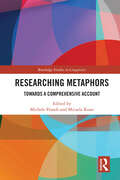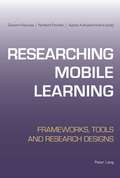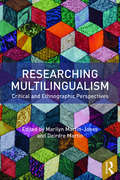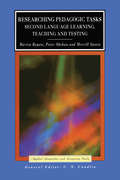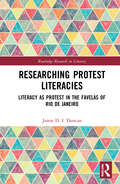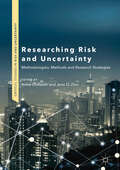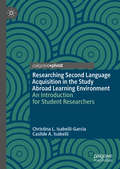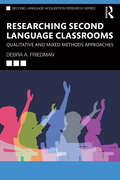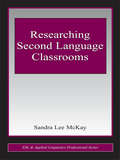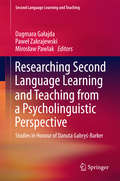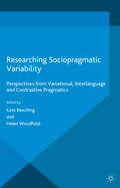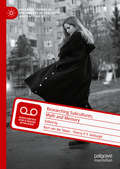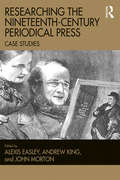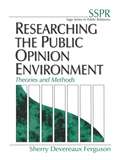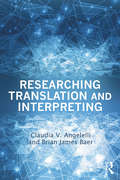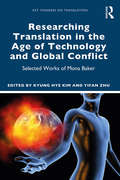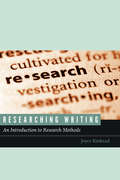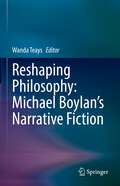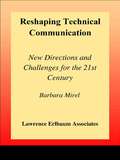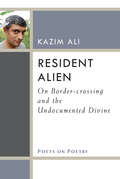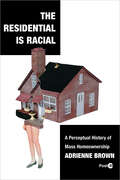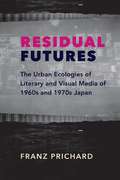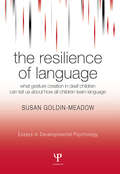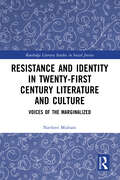- Table View
- List View
Researching Metaphors: Towards a Comprehensive Account (Routledge Studies in Linguistics)
by Michele Prandi Micaela RossiThis collection advocates for a more holistic picture of metaphor, extending the field’s focus beyond the cognitive paradigm and conventional metaphorical concepts to illustrate the possibilities afforded by the study of living metaphors. The volume brings together a diverse range of researchers in the discipline towards critically examining the presuppositions of the cognitive approach. The book shines a light on living metaphors – creative interpretations of conflictual meaning specific to a text or communicative act with their own unique functions – to throw into relief long-held tenets in existing metaphor research. Chapters reflect on the notion that creative metaphors spring from independent sources, not merely from metaphorical concepts, and the subsequent implications for our understanding of the relationship between linguistic forms and conceptual structures and the role of creative metaphors in organizing thought and action. Taken together, the book offers a complementary vision of languages and figures which integrates disparate lines of study within the cognitive paradigm with alternative perspectives for a more comprehensive portrait of metaphors. This book will be of interest to students and scholars interested in the study of metaphor, including such disciplines as theoretical linguistics, cognitive linguistics, semantics, literary studies, and philosophy of language.
Researching Metaphors: Towards a Comprehensive Account (Routledge Studies in Linguistics)
by Michele Prandi Micaela RossiThis collection advocates for a more holistic picture of metaphor, extending the field’s focus beyond the cognitive paradigm and conventional metaphorical concepts to illustrate the possibilities afforded by the study of living metaphors.The volume brings together a diverse range of researchers in the discipline towards critically examining the presuppositions of the cognitive approach. The book shines a light on living metaphors – creative interpretations of conflictual meaning specific to a text or communicative act with their own unique functions – to throw into relief long-held tenets in existing metaphor research. Chapters reflect on the notion that creative metaphors spring from independent sources, not merely from metaphorical concepts, and the subsequent implications for our understanding of the relationship between linguistic forms and conceptual structures and the role of creative metaphors in organizing thought and action. Taken together, the book offers a complementary vision of languages and figures which integrates disparate lines of study within the cognitive paradigm with alternative perspectives for a more comprehensive portrait of metaphors.This book will be of interest to students and scholars interested in the study of metaphor, including such disciplines as theoretical linguistics, cognitive linguistics, semantics, literary studies, and philosophy of language.
Researching Mobile Learning: Frameworks, Tools and Research Designs, Third Unrevised Edition
by Giasemi Vavoula Norbert Pachler Agnes Kukulska-HulmeThis book sets out the issues and requirements for mobile learning research, and presents recent efforts to specify appropriate theoretical frameworks, research methods and tools.
Researching Multilingualism: Critical and ethnographic perspectives
by Marilyn Martin-Jones Deirdre MartinResearching Multilingualism expertly engages with a new sociolinguistics of multilingualism, taking account of this new communicative order and the particular cultural and social conditions of our times. Seventeen chapters are divided into four sections covering: researching discourses, policies and practices; contemporary mobilities; Researching multilingual communication on-line; Multilingualism in research practice. This state-of-the-art overview of research methodologies in multilingual settings will be of interest for all students and researchers working in the area of multilingualism within Linguistics, Applied Linguistics, Education and Communication Studies.
Researching Pedagogic Tasks: Second Language Learning, Teaching, and Testing (Applied Linguistics and Language Study)
by Merrill Swain Martin Bygate Peter SkehanResearching Pedagogic Tasks brings together a series of empirical studies into the use of pedagogical tasks for second language learning, with a view to better understanding the structure of tasks, their impact on students, and their use by teachers. The volume starts with an introduction to the background and key issues in the topic area and is then organised into three sections: the first section focuses on the language and learning of students on tasks the second on the use of tasks in the language classroom the third on the use of tasks for language testing Each section begins with a succinct section introduction, and the volume concludes with an afterword relating the theme of the volume to issues in curriculum development. The chapters include both experimental and qualitative approaches to the topic, some providing original accounts of specific studies, others offering overviews of linked series of studies.
Researching Protest Literacies: Literacy as Protest in the Favelas of Rio de Janeiro (Routledge Research in Literacy)
by Jamie D. DuncanBy focusing on the textually mediated reactions of local residents, social movements, and media producers to policy changes implemented in the favelas of Rio de Janeiro, this book studies the development of literacy as a tool to mobilize, perform, and disseminate protest. Researching Protest Literacies presents a combination of ethnographic fieldwork and extensive archival research to analyse how traditional and technology-driven literacy practices informed a new cycle of social protest in favelas from 2006-2016. Chapters trace nuanced interactions, document changing power balances, and in doing so conceptualize five forms of literacy used to enact social change - campaigning literacies, memorial literacies, media-activist literacies, arts-activist literacies, and demonstration literacies. Building on these, the study posits protest literacies as a new way of researching the role of contemporary literacy in protest. This insightful monograph would be of interest to doctoral students, researchers, and scholars involved in the fields of literacy studies, arts education, and social movement studies, as well as those looking into research methods in education and international literacies more broadly.
Researching Risk and Uncertainty: Methodologies, Methods and Research Strategies (Critical Studies in Risk and Uncertainty)
by Jens O. Zinn Anna OlofssonUnderstanding and managing risk and uncertainty is a central task in contemporary societies characterised by rapid social, technological and environmental change. This book presents research approaches used by scholars who all share a passion to gain new insights in how individuals, organisations and societies approach uncertain futures and their potential dangers. The contributions illustrate the usefulness of particular methods and methodologies for researching risk in order to advance the understanding and management of social, technological and environmental challenges. With research strategies and approaches from sociology, psychology, history, linguistics, anthropology, and gender studies, Researching Risk and Uncertainty provides guidance and inspiration to students and scholars across a range of disciplines interested in risk, disaster and social crisis.
Researching Second Language Acquisition in the Study Abroad Learning Environment: An Introduction for Student Researchers
by Casilde A. Isabelli Christina L. Isabelli-GarcíaThis book is intended to introduce novice student researchers to second language acquisition in the study abroad learning environment. It reviews the existing literature and provides the emerging researcher an overview of the important factors to consider, informs them where to begin, and how to move forth an agenda for future research in this field. The book recognizes that aside from the academic advantages, study abroad programmes are an excellent tool for fostering extended and relevant interaction with native speakers. It provides reflection questions and activities, and guides the novice researcher in critically analysing existing research and to eventually carry out their own study. The book will be of use to beginning researchers who are new to linguistics in the areas of study abroad and second language acquisition.
Researching Second Language Classrooms: Qualitative and Mixed Methods Approaches (Second Language Acquisition Research Series)
by Debra A. FriedmanThis volume provides graduate students and experienced researchers with a comprehensive guide to applying qualitative and mixed methods in classroom-based research on second language learning and teaching.In addition to coverage of methods for collecting and analyzing data, Researching Second Language Classrooms offers in-depth discussions on a range of practical, theoretical, methodological, and ethical issues that can arise when conducting research in language classrooms. Throughout the volume, the emphasis on building both theoretical knowledge and practical skills helps to facilitate understanding of how qualitative and quantitative methods can complement each other. Each chapter includes examples drawn from a range of research settings as well as tasks for practicing data collection and analysis techniques, questions to prompt reflection, and suggestions for further reading.This book will serve as a valuable text for research methods courses as well as a resource for scholars and researchers of applied linguistics, SLA, and language learning and teaching.
Researching Second Language Classrooms
by Sandra Lee MckayThis text introduces teachers to research methods they can use to examine their own classrooms in order to become more effective teachers. Becoming familiar with classroom-based research methods not only enables teachers to do research in their own classrooms, it also provides a basis for assessing the findings of existing research. McKay emphasizes throughout that what a teacher chooses to examine will dictate which method is most effective. Each chapter includes activities to help readers apply the methods described in the chapter, often by analyzing research data.*Chapter I, Classroom Research, introduces the reader to major research purposes and research types as they relate to classroom research, the distinction between quantitative and qualitative research, the formulation of research questions and research designs, and ethical issues in research.*Chapter II, Researching Teachers and Learners, presents research methods that can be used to examine teachers' and learners' attitudes and behaviors: action research, survey research, interviews, verbal reports, diary studies, case studies, and ethnographies.*Chapter III, Researching Classroom Discourse, deals with methods that can be used to study the oral and written discourse of classrooms: interaction analysis, discourse analysis, text analysis, and ways to examine the social and political assumptions underlying the choice and presentation of content in second language teaching materials.*Chapter IV, Writing Research Reports, provides guidelines for both thesis writing and journal articles.Researching Second Language Classrooms is an ideal text for TESOL research methods courses and an essential resource for inservice teachers who wish to undertake classroom research.
Researching Second Language Learning and Teaching from a Psycholinguistic Perspective
by Dagmara Gałajda Paweł Zakrajewski Mirosław PawlakThis editedcollection explores the processes of secondlanguage learning and teaching from a psycholinguistic perspective. Authored by leading experts in the field, the book includes studies focusing on theoretical,empirical and practical aspects of second and foreign language education. PartOne offers contributionsdevoted to a range of learner-related factors, dealing with affective andcognitive variables, the process of reading and the acquisition of lexis. PartTwo brings together papers related to teacher awareness of second language instruction that focus on conversational styles, fostering interculturalpragmatics, teacher job satisfaction, the development of instructionalmaterials and challenges of teacher training in different contexts. It is of interest to researchers as well as graduate andpostgraduate students seeking fresh inspirations for their own empiricalinvestigations of the ways in which second and foreign languages are taught andlearned.
Researching Sociopragmatic Variability: Perspectives from Variational, Interlanguage and Contrastive Pragmatics
by Kate Beeching Helen WoodfieldResearching Sociopragmatic Variability showcases a range of research approaches to the study of speech acts and pragmatic markers across different languages and varieties of a language, investigating native and non-native usages and variation across gender, situation and addressee.
Researching Subcultures, Myth and Memory (Palgrave Studies in the History of Subcultures and Popular Music)
by Bart van der Steen Thierry P. F. VerburghThis book brings together contributions that analyse how subcultural myths develop and how they can be studied. Through critical engagement with (history) writing and other sources on subcultures by contemporaries, veterans, popular media and researchers, it aims to establish: how stories and histories of subcultures emerge and become canonized through the process of mythification; which developments and actors are crucial in this process; and finally how researchers like historians, sociologists, and anthropologists should deal with these myths and myth-making processes. By considering these issues and questions in relation to mythmaking, this book provides new insights on how to research the identity, history, and cultural memory of youth subcultures.
Researching the Nineteenth-Century Periodical Press: Case Studies
by Alexis Easley Andrew King John MortonExtending the work of The Routledge Handbook to Nineteenth-Century British Periodicals and Newspapers, this volume provides a critical introduction and case studies that illustrate cutting-edge approaches to periodicals research, as well as an overview of recent developments in the field. The twelve chapters model diverse approaches and methodologies for research on nineteenth-century periodicals. Each case study is contextualized within one of the following broad areas of research: single periodicals, individual journalists, gender issues, periodical networks, genre, the relationship between periodicals, transnational/transatlantic connections, technologies of printing and illustration, links within a single periodical, topical subjects, science and periodicals, and imperialism and periodicals. Contributors incorporate first-person accounts of how they conducted their research and provide specific examples of how they gained access to primary sources, as well as the methods they used to analyze the materials. The 2018 winner of the Robert and Vineta Colby Scholarly Book Prize. The Committee describes the focus of the book on methodology and case studies as “fresh and original,” and “useful for both experienced scholars and those new to the field.” "Overall. Case Studies suggests new ways of reading canonical authors, new unerstandings of the interprentation of the personal and the public, and an admirable energy in engaging with the structures of national and transnational periodical discourses that are clearly implicated in maintaining soft power within societies" -- Brian Maidment, Liverpool John Moores University
Researching the Public Opinion Environment: Theories and Methods
by Sherry Devereaux FergusonResearching the Public Opinion Environment: Theories and Methods informs the reader on the rationale, purposes, theories, and methodologies involved in researching the public. The book is divided into four parts. Part One looks at the theories and systems relevant to opinion research. Part Two addresses the topics of monitoring and analyzing the media. Part Three describes the basics of survey research, focus groups, Delphi techniques, stakeholder assemblies and Q methodology. Part Four analyzes the impact of the media.
Researching Translation and Interpreting: A Call For Dialogue Between Research And Practice (American Translators Association Scholarly Monograph Ser. #Xiv)
by Brian James Baer Claudia V. AngelelliThis volume offers a comprehensive view of current research directions in Translation and Interpreting Studies, outlining the theoretical concepts underpinning that research and presenting detailed discussions of the various methods used. Organized around three factors that are responsible for shaping the study of translation and interpreting today—post-positivist theoretical approaches, developments in the language industry, and technological innovations—this volume is divided into three parts: Part I introduces the basic concepts organizing translation and interpreting research, such as the difference between qualitative and quantitative research, between product-oriented and process-oriented studies, and between prescriptive and descriptive approaches. Part II provides a theoretical mapping of current translation and interpreting research, covering the theories underlying the current conceptualization of translation and interpreting, from queer studies to cognitive science. Part III explores the key methodological approaches to research in Translation and Interpreting Studies, including corpus-based, longitudinal, observational, and ethnographic studies, as well as survey and focus group-based studies. The international range of contributors are all leading research experts who use the methodologies in their work. They present the research aims of these methods, offer sample research questions that can—and cannot—be addressed by these methods, and discuss modes of data collection and analysis. This is an essential reference for all advanced undergraduates, postgraduates, and researchers in Translation and Interpreting Studies.
Researching Translation in the Age of Technology and Global Conflict: Selected Works of Mona Baker (Key Thinkers on Translation)
by Kyung Hye Kim Yifan ZhuMona Baker is one of the leading figures in the development of translation studies as an academic discipline. This book brings together fifteen of her most influential articles, carefully selected and grouped under three main topics that represent her most enduring contributions to the field: corpus-based translation studies, translation as renarration and translators in society. These applications and approaches have been widely adopted by translation scholars around the globe. The first section showcases Baker’s pioneering work in introducing corpus linguistics methodologies to the field of translation studies, which established one of the fastest growing subfields in the discipline. The second section focuses on her application of narrative theory and the notion of framing to the study of translation and interpreting, and her contribution to demonstrating the various ways in which translators and interpreters intervene in the negotiation of social and political reality. The third and final section discusses the role of translators and interpreters as social and political activists who use their linguistic skills to empower voices made invisible by the global power of English and the politics of language. Tracing key moments in the development of translation studies as a discipline, and with a general introduction by Theo Hermans and section introductions by other scholars contextualising the work, this is essential reading for translation studies scholars, researchers and advanced students.
Researching Writing: An Introduction to Research Methods
by Joyce KinkeadResearching Writing is an accessible, informative textbook that teaches undergraduates how to conduct ethical, authentic research in writing studies. The book introduces students to the research approaches used most often and offers a course framework for professors creating or teaching research courses themselves. Author Joyce Kinkead lays out the research process, including finding and defining questions, planning, and starting the research. Expository content introduces the language and methods of writing research, and specific methods are demonstrated in published examples, illustrating student work using student work and showing that it is possible for students to join the scholarly conversation in writing studies. Other features include student activities, instructor resources, student resources, and links to external content on journal websites, digital publications, YouTube, and similar work. The first-ever textbook for research methods in writing studies for undergraduates, Researching Writing takes a hands-on approach that excites and engages students in the depth and complexities of research and will influence the creation of courses in new writing majors as the field continues to grow.
Reshaping Philosophy: Michael Boylan’s Narrative Fiction
by Wanda TeaysThis volume offers original essays exploring what ‘fictive narrative philosophy’ might mean in the research and teaching of philosophy. The first part of the book presents theoretical essays that examine Boylan’s recent books: Teaching Ethics with Three Philosophical Novels and Fictive Narrative Philosophy: How Literature can Act as Philosophy. The second and third part offer essays on how Boylan executes his theory in the practice within his novels from his two series De Anima and Archē. The book clearly shows the unique aspects of the fictive narrative philosophy approach. First, it makes story-telling accessible to wide audiences. Second, story-telling techniques invoke devices that can set out complicated existential problems to the reader that offer an additional approach to thorny problems through the presentation of lived experience. Third, the discussion of these devices is a way to explore philosophical problems in a way that many can profit from. The book concludes with an essay in which Boylan responds to the critical challenges set out in Part One and the practical criticism set out in Parts Two and Three. Boylan addresses the key claims made by his objectors and defends his position. He engages with the authors in the way his theory is matched against his actual novels. This is useful reading for both philosophers and professors of literature teaching introductory as well as upper-level courses in the fields of philosophy, literature and criticism.
Reshaping Technical Communication: New Directions and Challenges for the 21st Century
by Barbara Mirel Rachel SpilkaThis anthology brings together voices from industry and academia in a call for elevating the status, identity, value, and influence of technical communicators. Editors Barbara Mirel and Rachel Spilka assert that technical communicators must depart from their traditional roles, moving instead in a more influential and expansive direction. To help readers explore the possibilities, contributions from innovative thinkers and leaders in technical communication propose ways to redefine the field's identity and purposes and to expand the parameters of its work. The chapters included here all point toward new directions for greater growth and influence of the field. Contributors depart from traditional ideas and solutions and discuss new and in some cases radical points, provoking further thought and discussion. Its exploration of fresh territory uncovers new research topics and directions, and provides an examination of both internal, industry-academia relationships and external relationships between technical communicators and other professionals. In its entirety, this collection represents an inclusive vision for the future, targeting such wide-ranging issues as creating effective professional organizations, disseminating research to diverse audiences, transitioning to more influential job roles, exerting leadership in usability, and creating hybrid identities and collaborative programs between industry and academic to support them. The diverse voices from industry and academia will inspire readers to think differently about the discipline's identity and direction, and to build on the ideas they find herein to effect change within their own spheres. As required reading for academics and professionals in technical communication, this collection is a critical step in reshaping and reinvigorating the technical communication field to ensure its survival and growth in the 21st century.
Resident Alien: On Border-crossing And The Undocumented Divine
by Mohammed Kazim AliKazim Ali uses a range of subjects--the politics of checkpoints at international borders; difficulties in translation; collaborations between poets and choreographers; and connections between poetry and landscape, or between biotechnology and the human body--to situate the individual human body into a larger global context, with all of its political and social implications. He finds in the quality of ecstatic utterance his passport to regions where reason and logic fail and the only knowledge is instinctual, in physical existence and breath. This collection includes Ali's essays on topics such as Anne Carson's translations of Euripides; the poetry and politics of Mahmoud Darwish; Josey Foo's poetry/dance collaborations with choreographer Leah Stein; Olga Broumas' collaboration with T. Begley; Jorie Graham's complication of Kenneth Goldsmith's theories; the postmodern spirituality of the 14th century Kashmiri mystic poet Lalla; translations of Homer, Mandelstam, Sappho, and Hafez; as well as the poet Reetika Vazirani's practice of yoga. "Ali has a vibrant and generous personality that lets one hear the inner music that makes us remember what it is to be human. " --Painted Bride Quarterly
The Residential Is Racial: A Perceptual History of Mass Homeownership (Post*45)
by Adrienne BrownHousing experts and activists have long described the foundational role race has played in the creation of mass homeownership. This book insistently tracks the inverse: the role of mass homeownership in changing the definition, perception, and value of race. In The Residential is Racial Adrienne Brown reveals how mass homeownership remade the rubrics of race, from the early cases realtors made for homeownership's necessity to white survival through to the 1968 Fair Housing Act. Reading real estate archives and appraisal textbooks alongside literary works by F. Scott Fitzgerald, John Steinbeck, Lorraine Hansberry, Richard Wright, Gwendolyn Brooks, James Baldwin, Ralph Ellison, John Cheever, and Thomas Pynchon, Brown goes beyond merely identifying the discriminatory mechanisms that the real estate industry used to forestall black homeownership. Rather, she reveals that redlining and other forms of racial discrimination are perceptual modes, changing what it means to sense race and assign it value. Resituating residential discrimination as a key moment within the history of perception and aesthetics as well as of policy, demography, and democracy, we get an even more expansive picture of both its origins and its impacts. This book discovers that the racial honing of perception on the block—seeing race like a bureaucrat, an appraiser, and a homeowner—has become central to the functioning of the residential itself.
Residual Futures: The Urban Ecologies of Literary and Visual Media of 1960s and 1970s Japan (Studies of the Weatherhead East Asian Institute, Columbia University)
by Franz PrichardIn the postwar years, an eruption of urbanization took place across Japan, from its historical central cities to the outer reaches of the archipelago. During the 1960s and 1970s, Japanese literary and visual media took a deep interest in cities and their problems, and what this rapid change meant for the country. In Residual Futures, Franz Prichard offers a pathbreaking analysis of the works wrought from this intensive urbanization, mapping the ways in which Japanese filmmakers, writers, photographers, and other artists came to grips with the entwined ecologies of a drastic transformation.Residual Futures examines crucial works of documentary film, fiction, and photography that interrogated Japan’s urbanization and integration into the U.S.-dominated geopolitical system. Prichard discusses documentary filmmaker Tsuchimoto Noriaki’s portrait of the urban “traffic war” and the remaking of Tokyo for the 1964 Olympics, novelist Abe Kōbō’s depictions of infrastructure and urban sociality, and the radical notions of landscape that emerge from the critical and photographic work of Nakahira Takuma. His careful readings reveal the shifting relationships among urban materialities and subjectivities and the ecological, political, and aesthetic vocabularies of urban change. A novel cultural history of critical urban discourse in Japan, Residual Futures brings an interdisciplinary approach to Japanese literary and visual media studies. It provides a vital new perspective on the infrastructural aesthetics and entangled urban and media conditions of the global Cold War.
The Resilience of Language: What Gesture Creation in Deaf Children Can Tell Us About How All Children Learn Language (Essays in Developmental Psychology)
by Susan Goldin-MeadowImagine a child who has never seen or heard any language at all. Would such a child be able to invent a language on her own? Despite what one might guess, the children described in this book make it clear that the answer to this question is 'yes'. The children are congenitally deaf and cannot learn the spoken language that surrounds them. In addition, they have not yet been exposed to sign language, either by their hearing parents or their oral schools. Nevertheless, the children use their hands to communicate - they gesture - and those gestures take on many of the forms and functions of language. The properties of language that we find in the deaf children's gestures are just those properties that do not need to be handed down from generation to generation, but can be reinvented by a child de novo - the resilient properties of language. This book suggests that all children, deaf or hearing, come to language-learning ready to develop precisely these language properties. In this way, studies of gesture creation in deaf children can show us the way that children themselves have a large hand in shaping how language is learned.
Resistance and Identity in Twenty-First Century Literature and Culture: Voices of the Marginalized (Routledge Literary Studies in Social Justice)
by Navleen MultaniResistance and Identity in Twenty-First Century Literature and Culture: Voices of the Marginalized is a compendium of reflections on literary texts, politics of literature and culture. The book proffers ruminations on the pivotal role of constructive and positive resistance to reconstruct identities for meaningful human existence. The disciplinary power and dominance coerce the natural body to resist and yearn for freedom. One can establish unique identity by refusing to conform to pressures of society that deform the natural body. Dominant forces and oppressive structures evoke resistance that can range from 'polite demurral' to 'refusal'. Resistance comes from the 'will' that refuses to be controlled and governed. The 'refusal' of the ordinary illuminates ordinary lives/ bodies. Language and literary texts contain essential truths of such human existence. Words and imaginary worlds in literary works reveal truth and suggest possibilities for reconfiguring the order.
